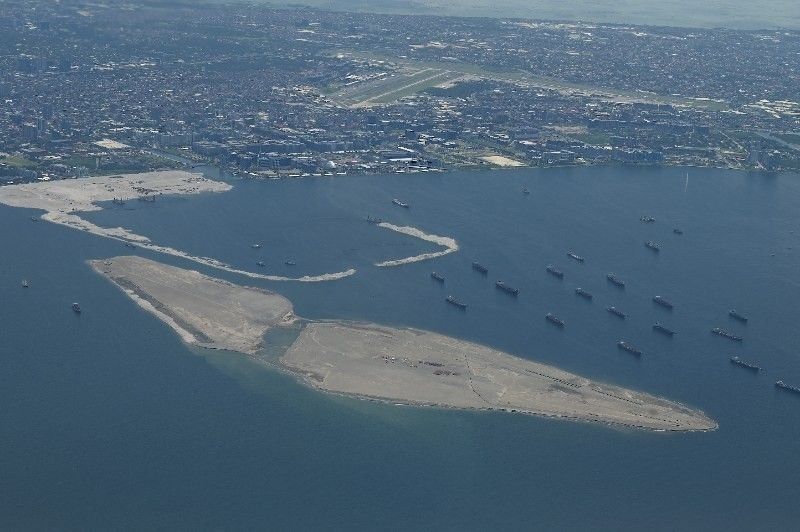Need to review, change permitting process for reclamation highlighted in Senate hearing

MANILA, Philippines — There is a need to review and rectify flaws in the government’s process for approving reclamation projects in order to safeguard both the environment and communities, a senator said Wednesday.
The Senate is looking into the impacts of reclamation activities on coastal and marine ecosystems and communities, and the permitting process for these projects after President Ferdinand “Bongbong” Marcos Jr. ordered the suspension of 22 reclamation projects in Manila Bay.
Sen. Cynthia Villar, who heads the panel on environment, natural resources and climate change, said that there must be legislation that effectively regulates reclamation activities and ensures that these projects are “not arbitrary or capricious.”
“There must be something wrong with the process. We want to review the processes and change whatever is wrong,” Villar said.
The initiation of a reclamation project begins with the proponent, usually a local government unit, approaching the Philippine Reclamation Authority, which will issue a memorandum of agreement.
Meanwhile, the role of the Department of Environment and Natural Resources is to issue an environmental compliance certificate and an area clearance.
An area clearance is a document that declares a site suitable for reclamation. An ECC certifies that the proposed project will not cause significant environmental impacts and that the proponent has complied with the requirements of the Environmental Impact Statement system.
The current arrangement mandates that all ECCs for environmentally critical projects must bear the signature of the secretary. According to Environment Undersecretary Juan Miguel Cuna, the task of signing the ECC was previously delegated to the EMB director, but “it was always by the authority of the secretary.”
“The current practice now is that… all protected areas must be indicated in the application for ECC and mitigating measures must be undertaken in terms of possible impacts to protected areas,” Environment Secretary Maria Antonia Yulo-Loyzaga said.
During the Senate hearing, PRA Assistant General Manager Joseph Literal said there are a lot of “illegal and unauthorized” reclamation projects across the archipelago.
‘Victims’ of reclamation projects
Representatives from businesses and communities talked about the threats posed by reclamation projects on their lives and livelihoods.
Ildefonso Tronqued Jr., commodore of the Manila Yacht Club, said their organization’s main concern is maritime safety.
“All of these obstructions and sand that have been put around the bay are hazards. They don’t have any kind of lighting. They don’t have any kind of warnings,” Tronqued said.
He added that that club was not consulted and “was not made aware of what’s happening.”
Esteban Peña Sy, who owns Sofitel Philippine Plaza, said the five-star accommodation is also a “victim of pollution and flooding” caused by reclamation activities in Manila Bay.
For group Pambansang Lakas ng Kilusang Mamamalakaya ng Pilipinas (PAMALAKAYA), small-scale fishers will bear the brunt of these projects.
“Kami talaga ‘yung direktang apektado. Mukhang hindi nakikita ng ating mga ahensya kung gaano kahalaga ‘yung ambag ng mga mangingisda sa kabuhayan at buhay ng ating bansa,” PAMALAKAYA national chairperson Fernando Hicap said.
(We are the ones directly affected. It seems that our agencies do not see how important the contributions of fishermen are to the livelihood and life of our country.)
One-year study
In August, President Ferdinand Marcos Jr. ordered the suspension of reclamation projects in Manila Bay pending a review of their environmental and social impacts, and compliance with environmental regulations.
Yulo-Loyzaga said the environment department is finalizing an agreement with scientists from the University of the Philippine Marine Science Institute and the Manila Observatory for the conduct of the cumulative impact assessment. The review is expected to be completed in at least one year.
“Our work will be recommendatory and will aid us in governance review of reclamation process and permitting,” Yulo-Loyzaga said. She added that decisions on suspension “will be made by higher authorities than ourselves.”
Environmentalists, scientists and fishers continue to press the government for an official written order suspending reclamation activities in Manila Bay, more than one month after Marcos made the declaration.
“It is important to strictly implement the suspension immediately and throughout the entire duration of the cumulative study to prevent additional negative environmental and social impacts brought by dump-and-fill projects,” Advocates of Science and Technology for the People (AGHAM) said.
- Latest






























